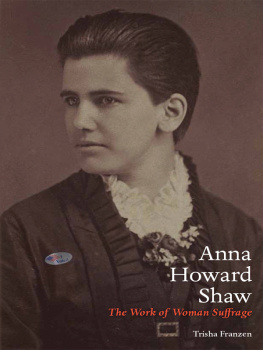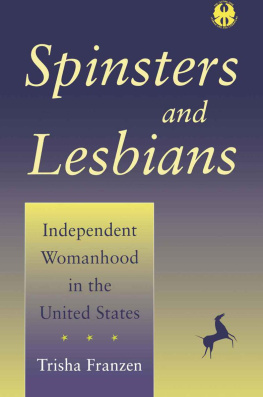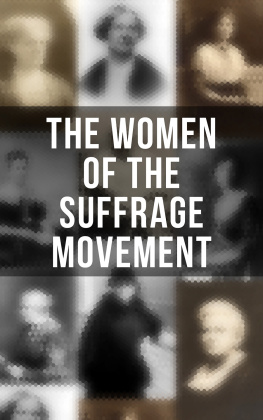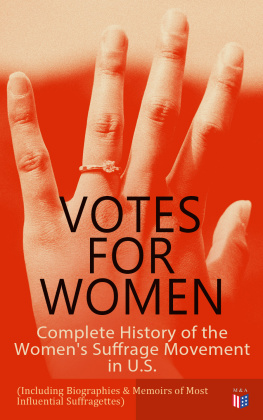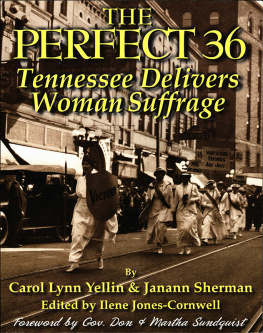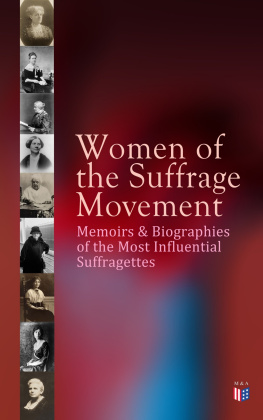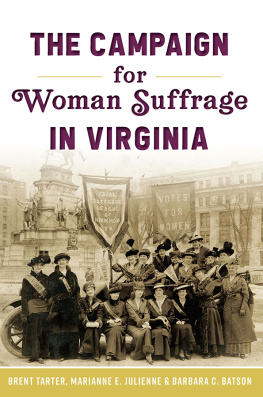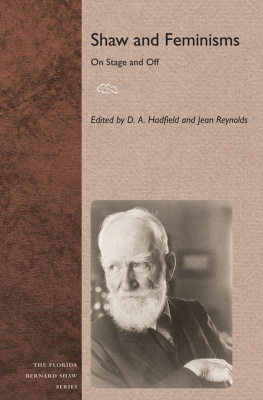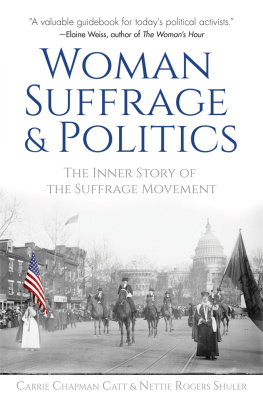TRISHA FRANZEN is a professor of women's and gender studies at Albion College and the author of Spinsters and Lesbians: Independent Womanhood in the United States.
ACKNOWLEDGMENTS
After so many years, my debts to all the people who assisted me along the way are tremendous. I realize there is no means to adequately acknowledge and appropriately thank everyone, but I will make an attempt to recognize as many of the people who worked with me as I can.
This book would not have happened if Albion College had not kept alive their connection with Anna Howard Shaw by naming their Women's Center after her. Many additional people and offices at Albion have supported this work over the years. Within Academic Affairs, the Faculty Development monies that the Faculty Development Committee generously awarded me for this project allowed for numerous research trips and conference presentations from 1997 on. Similarly the Women's and Gender Studies supported this project with financial and multiple other levels of support.
The staff of the Albion College Library and I have become much closer as a result of this work. Mike VanHouten was always there when I had any research questions or problems with Endnotes. Not only did he find Anna Howard Shaw sources for me, but he convinced me that he welcomed all these large and small challenges. Even though we can now request interlibrary loan items via the web, I always knew that there was a person, usually Allie Moore, or Becky Markovich in the months Allie was off, in that office who would persist even when I requested another obscure item. I was frequently amazed with the materials that they located for me. While Jennie Thomas has moved on from Albion College, during her time there she made the College and Methodist Archives most accessible. Our entire library staff consistently goes beyond what is expected, for example, John Kondelik and Becky Markovich relocating the microfilm reader during renovations so that I could finish the chapter at hand. Thank you all so much.
Every one of my visits to the Schlesinger Library at the Radcliffe Institute has been an adventure and a joy. The peopleespecially Sarah Hutcheon and Lynda Leahy from my last visitthe collections, and the support were all invaluable assets to this project and, I am certain, many others. The Schlesinger Library is a treasure. I am always amazed with the efficiency of the staff at the Library of Congress, especially in the Manuscript Reading Room. Though this huge, public institution could be impersonal, it isn't. Everyone is consistently helpful. And I don't know whether it was because my hair is now more white than brown, but getting a personal escort between buildings via the underground tunnels was a special treat this last visit.
Similarly, Marianne Hansen and others in the Special Collections at the Bryn Mawr College Library; Mary M. Huth at the Department of Rare Books, Special Collections and Preservation of the University of Rochester Library; Kara M. Jackman of the Archives of the School of Theology Library at Boston University; and Karen Kukil and her staff at the Sophia Smith Collection of Smith College all went beyond my requests and made sure I knew about the other items that might help my research. I am similarly indebted to Ana Guimaraes and her staff in the Division of Rare and Manuscript Collections of Cornell University Library who made special arrangements for me to receive the papers I needed. When I was getting to the end of my research and I knew I couldn't get to the United Methodist Archives Center at Drew University, Frances Lyons-Bristol generously located and forwarded to me the materials I needed. From the very warm days early in this research when I visited the Archives at the University of Kentucky through the exceptionally cold day in December 2008 when I visited the Peace Collection at the Swarthmore College Library, in each place there were warm welcomes and helpful staff members.
At the Mecosta County Historical Society in Big Rapids, Michigan, there is a group of people dedicated to remembering and honoring Anna Howard Shaw. I especially want to thank Mariann Hahn and Maxine Sofoulis for all they shared with me, from the materials in the collection and directions to the Shaw family land through a tour of the jail where Shaw's brother Jack worked. Cynthia Hall of the Osterville, Massachusetts, Historical Society opened that museum to me and allowed me to get a sense of the area where Shaw built her first home and enjoyed rare leisure and time with her family. The maps, directories, and histories that the people at the Immigrant City Archives in Lawrence, Massachusetts, shared with me gave me a much fuller sense of Shaw's life in this emerging industrial city. I am also grateful for the help I received from the Tyne and Wear (Newcastle, U.K.) Archives early in this project. It was great to have an excuse to visit Alnwick and Alnwick Castle, but more important was the information about the Castle's and Duchess's School Records that the individuals there forwarded to me. Because there are so few records from Shaw's early life, I am especially appreciative of the care all these organizations take preserving local histories.
The pastors and members of both the Dennis Union Church and the Evangelical Free Church of East Dennis welcomed me and gladly shared all the information they had about Shaw. I was thrilled to be able to hold Shaw's beautiful communion service. I especially want to thank Rev. John Brink of the former and Rev. David E. Johnson of the latter for their help. I regret and apologize for not following up on all the leads from those visits.
Laurie Matheson, of the University of Illinois Press, has encouraged my work since I first spoke to her about it. She guided the proposal through the various reviews and processes with an impressive efficiency. Jennifer Clark and Nancy Albright have been generous and careful guardians of this manuscript. Thank you. Any remaining errors are mine. I also appreciate the helpful comments from the anonymous reviewers.
It was a case of wonderful coincidence at the Seneca Fall National Women's Rights Historical Park in 1996 that brought me into contact with some of the descendents of Shaw's family. Richard Freemen graciously responded to my assorted inquiries and put me in touch with Eleanor MacDowell Sherry with whom I had several delightful and informative conversations. Karin Curtiss contacted me when she came across information about my research. I appreciate all their help and support. I only hope that this work meets in some way their expectations.
Eleanor Sherry facilitated my connection with the Rev. Elaine Buker whose passion for keeping Anna Howard Shaw's story alive is impressive. Rev. Buker sent me files containing many documents and clippings I would never have located otherwise. Her materials made this a better book. Similarly George and Peggy Drum welcomed me and my father to Alnwick Lodge. Their stories brought the house alive. I cannot thank all of these individuals enough.
I am grateful for the encouragement and thoughtful feedback from various colleagues along the way. The Great Lakes College Association (GLCA) Women's Studies Roundtable, especially Meryl Altman, noted the importance of Shaw's identity for this biography. Several conference presentations brought instructive responses that strengthen this effort, including those from the National Women's Studies Association, the singlewomen roundtable at the 2008 Berkshire Conference on the History of Women, the 2009 Western Association of Women Historians, and the Single Women in History Conference in Bristol, U.K., in 2006. Additionally I am in debt to Helen Bannan, Robert P. J. Cooney Jr., Ellen Carol DuBois, Kimberly Jensen, and Leila Rupp who encouraged this work and generously shared sources and insights.
How do I begin to thank my family? I suspect that my siblings, nieces, and nephews know more about Anna Howard Shaw than most historians. Marie, Paul, Bill, Mark, Liz, and Val shared my enthusiasm for this project, though Marie, Paul, and Bill didn't live to see its completion. Val housed me on several of my research trips to the D.C. area. It has been so fortunate that Shaw chose to live most of her adult life in my hometown of Philadelphia so that research trips could also be family visits. My late mother Lavene Haas Franzen modeled a strong womanhood for me and all of us in our family, while my father Paul William Franzen passed on to me a deep fascination with and appreciation of history. Together they taught all of us the importance of education and hard work. Though my father recently entered his ninth decade, he has always been more than happy to accompany me as we searched out the various Shaw residences or related archives in and around Philadelphia.

